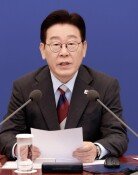Big Corporations Implementing Countermeasures to High Oil Prices
Big Corporations Implementing Countermeasures to High Oil Prices
Posted August. 15, 2004 21:57,
Samsung group affiliates are coming up with measures to respond to the unexpectedly high international oil prices, industrial circles said on Sunday.
We have not yet taken specific measures like adjusting our business goals, but the prolonged high oil prices will force us to revise them for the latter part of 2004, said Samsung. Because oil price hikes will hurt advanced economies, such as the U.S. and Japan, the recovery of domestic businesses will be delayed.
Hyundai and Kia Motors, which recorded their highest sales in the first half of this year helped by increased exporting, have strengthened their liquidity by refraining from unnecessary investment and spending.
Hyundai Motors revised this years sales target from 710,000 to 605,000 units, and Kia Motor from 415,000 to 295,000 units.
LG Electronics is bracing itself for high oil prices through its TDR (Tear Down & Redesign) initiatives. TDR aims to cut down costs and enhance productivity by breaking down the existing production process and redesigning it.
As for home appliances, when the average crude oil prices (Dubai oil) rise from $35 to $45, to $55, and to $65 per barrel, the purchasing price of materials goes up by two, four, and six percent, respectively, said LG Electronics. We have redesigned our production process to prepare ourselves against such circumstances.
Airline and petrochemical industries, which are highly vulnerable to oil price hikes, have already implemented countermeasures against soaring oil prices.
Korean Air is holding regular meetings on cost cutting attended by its CEO, and has decided to raise the airfare by an average of four to five percent beginning August 15.
Korean Air and Asiana Airlines estimate the extra burden from surging oil prices at $400 billion and $120 billion, respectively, this year.
We cannot raise the price of our products despite oil price hikes, because many of our customers, petrochemical businesses, have already gone under, said Samsung Petrochemical. We plan to increase exporting from last years 28 percent to 35 percent at the end of this year.
Koreas leading chemical fiber producer Kolon said, The only measures we can take in the short term are cutting costs and diversifying our business customers. We will inevitably revise our business plans for the third and fourth quarters if oil prices remain high.
Joong-Hyun Park Keuk-In Bae sanjuck@donga.com bae2150@donga.com



![아침 공복 따뜻한 물 한 잔, 정말 살 빠지고 해독될까?[건강팩트체크]](https://dimg.donga.com/c/138/175/90/1/wps/NEWS/IMAGE/2026/03/05/133467930.3.jpg)



